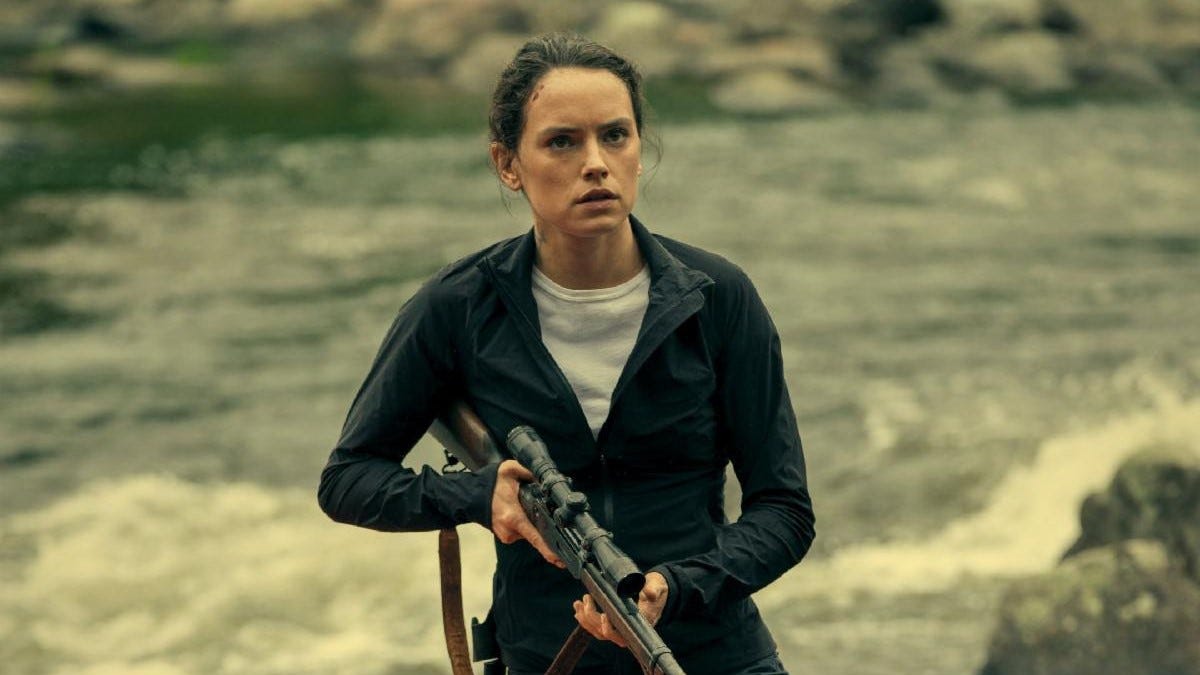The Marsh King's Daughter is an Affecting Exploration of Trauma and Love
Memory, truth, and where the two diverge
Light spoilersSometimes I go see a movie with no idea what it’s about.
I had never heard of The Marsh King’s Daughter before I started looking at show times this week. I’m fairly confident I’d read about Daisy Ridley starring in a new film—my antenna picks up the faintest of Star Wars signals—so I knew it existed, theoretically. But the name of the movie just would not stick in my head.
I actually blanked when I went to buy our tickets. “Two for The Marsh King’s… Daughter?” As I sit here, I can’t even be sure I actually said that. I may have requested tickets to The Winter King’s Daughter, or The Witch King’s Daughter, or The Marsh King’s Witch.1 I have been known to do such things.
I’m happy to report the title is the worst thing about this movie.
The Marsh King’s Daughter is a thriller about a woman named Helena Pelletier (Ridley) who was raised in the wilds of Michigan’s Upper Peninsula by her father, Jacob Holbrook (Ben Mendelsohn), a scruffy survivalist with a tattoo kink. Helena’s mother is there, too, but she mostly sticks to the shadows. She’s pivotal to the story but goes entirely unnamed—she’s literally credited as Helena’s mother—so you know, not that pivotal.
Jacob kidnapped Helena’s mom, dragged her into the wild, and held her in captivity for 12 years. Much of the movie is about Helena coming to terms with the fact that her father is not the man she remembers from childhood. That her memories are faulty and unreliably idyllic, and not representative of what actually happened.
Memory and truth are something I think about a lot.
I am estranged from my father because of things he did or allowed to happen when I was a child. Those things are decades in the past but they linger in the shadows of my memory. Sometimes I wonder if I remember it all correctly. Sometimes I wonder if there are horrors I’ve forgotten. Time will do that to you, and truth sometimes is a matter of perspective.
He would deny my version of events. Has denied it, in fact. He remembers it differently. Not that it was good, but that he was less-bad, and in which I, the child, bear a sizeable portion of the blame. Taking responsibility requires acknowledging things he’d rather not, so he doesn’t.
I discovered arson, shoplifting, and pornography when I lived with him. I broke untold rules and told uncountable lies. So yes, I was a problem. A house is a home, but sometimes it’s a prison. And like prison, you do whatever it takes to survive. I moved out when I was 12, after a social worker intervened because somebody had to.
You could say I have a vested interest in a story in which the hero comes face-to-face with the architect of their pain and is able to ask the only question worth asking: Why?
Jacob—who has since been dubbed the Marsh King by the media because it has a better ring than convicted kidnapper-rapist-murder—escapes custody and vanishes back into the vast, untracked wilderness. It falls to Helena to track him down using the skills she learned from him, which suggests a certain kind of movie that never quite materializes. On the thriller spectrum, The Marsh King is more Shutter Island than The Equalizer.
This is the first movie I’ve seen Ridley in since The Rise of Skywalker (2019), which I hated so much I’ve scrubbed it from memory. So practically speaking, this is the first Ridley film I’ve seen since The Last Jedi (2017). Which is a shame. The new cast was one of the consistently bright spots of the Sequel Trilogy, and Ridley was no exception. She is wonderful at emoting and is a great crier, which doesn’t sound like a desirable skill but it absolutely is. Her role in The Marsh King’s Daughter—gads, that title’s not getting any better—demands a more stoic performance. She’s harder in this movie, cut from granite. For his part, Mendelsohn is absolutely believable as a closet maniac who enjoys cosplaying as a loving father.
When Helena finally confronts Jacob, it’s not the powder keg you might expect. Again, this is not really a revenge narrative. There’s anger there, and pain, but love muddies everything. And that’s maybe the realest part of the film.
I still love my father. It’s an involuntary decision, one made at the cellular level. But sometimes love isn’t enough.
I contend that all of my made-up titles are vastly superior, though they obviously would tell very different stories.




You just named the new Decemberists’ album: The Winter King’s Daughter. Free tix 4LYFE!! It sounds like this flick is a little uneven, but worth a watch. The premise& its layers sound amazing. And I am deeply sorry for your childhood trauma. Kids should never have to bear those burdens. Write that f#%^* into some kind of mutant character in one of your tales. 😉♥️
Reading that left me with a burning question: can London-born Daisy Ridley pull off a Yooper accent? Because until this moment I did not know I needed to hear Rey talk about going to Escanaba to get pasties.